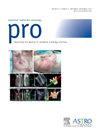再照射治疗局部复发性直肠腺癌。
IF 3.4
3区 医学
Q2 ONCOLOGY
引用次数: 0
摘要
曾接受过放疗的直肠癌复发给治疗带来了困难。挽救性治疗可以治愈疾病,但通常需要多模式治疗,这可能会带来严重的治疗相关发病率。在这种情况下,再放疗是治疗考虑中常见的一部分,如何在适当的积极治疗以提高疾病控制率和治愈率与过量毒性之间取得平衡是一项挑战。手术仍是治疗放疗后局部复发直肠癌(LRRC)的主要手段。术前再照射可提高R0切除率和局部控制率,并与疾病控制效果的改善相关。在对局部复发直肠癌(LRRC)进行再放疗时,通常会采用改变分割和术中放疗来提高治疗率。在此,我们将讨论支持 LRRC 多模式挽救治疗的证据,包括手术挽救的重要性、再照射的益处、再照射的各种方法以及治疗相关的毒性反应。最后,我们就如何对局部复发直肠癌进行再照射提出了建议。本文章由计算机程序翻译,如有差异,请以英文原文为准。
Reirradiation in the Management of Locally Recurrent Rectal Adenocarcinoma
Rectal cancer recurrence after prior radiation therapy presents a difficult treatment challenge. Salvage treatment can be curative; however, it often requires multimodality therapy which can come with significant treatment-related morbidity. Reirradiation is a common part of treatment considerations in this setting and presents challenges in balancing appropriately aggressive therapy to improve disease control and cure rates with the addition of excess toxicity. Surgery remains the mainstay of curative salvage therapy for locally recurrent rectal cancer (LRRC) after prior radiation. Preoperative reirradiation improves R0 resection rates and local control and is associated with improved disease control outcomes. Altered fractionation and intraoperative radiation therapy are often used to improve the therapeutic ratio in the setting of reirradiation for LRRC. Herein, we discuss the evidence supporting multimodality salvage therapy for LRRC, including the importance of surgical salvage, the benefits of reirradiation, various approaches for reirradiation, and treatment-associated toxicities. Finally, we provide our recommendations for how to approach reirradiation for locally recurrent rectal cancer.
求助全文
通过发布文献求助,成功后即可免费获取论文全文。
去求助
来源期刊

Practical Radiation Oncology
Medicine-Radiology, Nuclear Medicine and Imaging
CiteScore
5.20
自引率
6.10%
发文量
177
审稿时长
34 days
期刊介绍:
The overarching mission of Practical Radiation Oncology is to improve the quality of radiation oncology practice. PRO''s purpose is to document the state of current practice, providing background for those in training and continuing education for practitioners, through discussion and illustration of new techniques, evaluation of current practices, and publication of case reports. PRO strives to provide its readers content that emphasizes knowledge "with a purpose." The content of PRO includes:
Original articles focusing on patient safety, quality measurement, or quality improvement initiatives
Original articles focusing on imaging, contouring, target delineation, simulation, treatment planning, immobilization, organ motion, and other practical issues
ASTRO guidelines, position papers, and consensus statements
Essays that highlight enriching personal experiences in caring for cancer patients and their families.
 求助内容:
求助内容: 应助结果提醒方式:
应助结果提醒方式:


